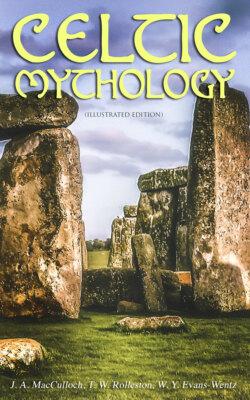Читать книгу CELTIC MYTHOLOGY (Illustrated Edition) - T. W. Rolleston - Страница 64
На сайте Литреса книга снята с продажи.
The Celts of To-day
ОглавлениеIn view of the undeniably mixed character of the populations called “Celtic” at the present day, it is often urged that this designation has no real relation to any ethnological fact. The Celts who fought with Caesar in Gaul and with the English in Ireland are, it is said, no more—they have perished on a thousand battlefields from Alesia to the Boyne, and an older racial stratum has come to the surface in their place. The true Celts, according to this view, are only to be found in the tall, ruddy Highlanders of Perthshire and North-west Scotland, and in a few families still surviving in Ireland and in Wales. In all this I think it must be admitted that there is a large measure of truth. Yet it must not be forgotten that the descendants of the Megalithic People at the present day are, on the physical side, deeply impregnated with Celtic blood, and on the spiritual with Celtic traditions and ideals. Nor, again, in discussing these questions of ethnic-character and its origin, must it ever be assumed that the character of a people can be analysed as one analyses a chemical compound, fixing once for all its constituent parts and determining its future behaviour and destiny. Race-character, potent and enduring though it be, is not a dead thing, cast in an iron mould, and thereafter incapable of change and growth. It is part of the living forces of the world; it is plastic and vital; it has hidden potencies which a variety of causes, such as a felicitous cross with a different, but not too different, stock, or—in another sphere—the adoption of a new religious or social ideal, may at any time unlock and bring into action.
Of one thing I personally feel convinced—that the problem of the ethical, social, and intellectual development of the people constituting what is called the “Celtic Fringe” in Europe ought to be worked for on Celtic lines; by the maintenance of the Celtic tradition, Celtic literature, Celtic speech—the encouragement, in short, of all those Celtic affinities of which this mixed ethnicity is now the sole conscious inheritor and guardian. To these it will respond, by these it can be deeply moved; nor has the harvest ever failed those who with courage and faith have driven their plough into this rich field. On the other hand, if this work is to be done with success it must be done in no pedantic, narrow, intolerant spirit; there must be no clinging to the outward forms of the past simply because the Celtic spirit once found utterance in them. Let it be remembered that in the early Middle Ages Celts from Ireland were the most notable explorers, the most notable pioneers of religion, science, and speculative thought in Europe.44 Modern investigators have traced their footprints of light over half the heathen continent, and the schools of Ireland were thronged with foreign pupils who could get learning nowhere else. The Celtic spirit was then playing its true part in the world-drama, and a greater it has never played. The legacy of these men should be cherished indeed, but not as a museum curiosity; nothing could be more opposed to their free, bold, adventurous spirit than to let that legacy petrify in the hands of those who claim the heirship or their name and fame.
